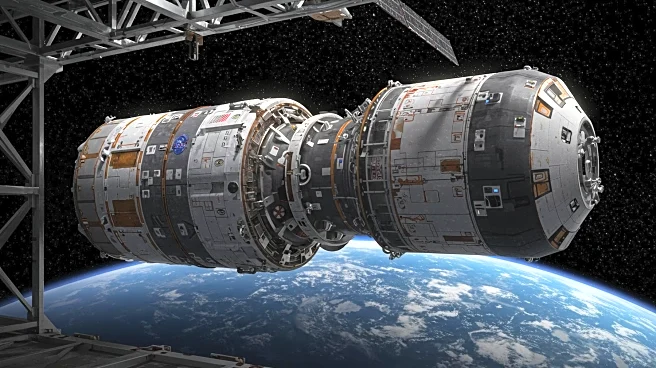What is the story about?
What's Happening?
NASA is gearing up for the launch of the SpaceX Falcon 9 rocket carrying the Dragon cargo craft, scheduled for no earlier than 2:45 a.m. on Sunday from Cape Canaveral Space Force Station in Florida. The Dragon is set to dock at the International Space Station's Harmony module at 7:30 a.m. on Monday, delivering over 5,000 pounds of science, supplies, and hardware to the Expedition 73 crew. NASA Flight Engineers Mike Fincke and Jonny Kim will oversee Dragon's automated approach and rendezvous, with Fincke being the first to open the hatch and begin four months of cargo operations. The crew, including NASA astronaut Zena Cardman and JAXA's Kimiya Yui, has been preparing by reviewing the mission profile and cargo details. Concurrently, the crew continues human research, focusing on the effects of weightlessness on the heart, muscle, and bone systems.
Why It's Important?
The Dragon cargo mission is crucial for sustaining the International Space Station's operations and scientific research. The supplies and hardware delivered will support ongoing experiments that explore the impact of microgravity on human health, which is vital for future long-duration space missions. The research conducted aboard the ISS contributes to advancements in health monitoring tools and exercise programs, potentially benefiting both space travelers and individuals on Earth. The mission also underscores the collaboration between NASA and SpaceX, highlighting the role of commercial partnerships in expanding space exploration capabilities.
What's Next?
Following the successful docking of the Dragon cargo craft, the Expedition 73 crew will begin unpacking and stowing the delivered items, facilitating various scientific investigations. The crew will continue their research on the effects of microgravity, with potential implications for improving astronaut health during extended missions. The data collected may lead to enhanced exercise regimens and rehabilitation techniques. Additionally, NASA will maintain its coverage of the mission, providing updates through its blog and social media channels.
Beyond the Headlines
The ongoing research aboard the ISS has broader implications for understanding human physiology in space, which is essential for future missions to Mars and beyond. The insights gained could lead to innovations in medical technology and exercise science, benefiting not only astronauts but also people on Earth. The collaboration between international space agencies and commercial entities like SpaceX exemplifies the evolving landscape of space exploration, where partnerships are key to advancing scientific and technological frontiers.















